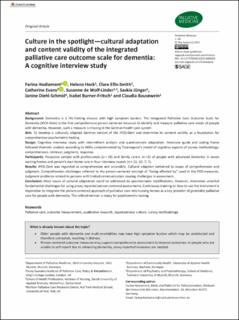Please use this identifier to cite or link to this item:
https://doi.org/10.21256/zhaw-22372Full metadata record
| DC Field | Value | Language |
|---|---|---|
| dc.contributor.author | Hodiamont, Farina | - |
| dc.contributor.author | Hock, Helena | - |
| dc.contributor.author | Ellis-Smith, Clare | - |
| dc.contributor.author | Evans, Catherine | - |
| dc.contributor.author | de Wolf-Linder, Susanne | - |
| dc.contributor.author | Jünger, Saskia | - |
| dc.contributor.author | Diehl-Schmid, Janine | - |
| dc.contributor.author | Burner-Fritsch, Isabel | - |
| dc.contributor.author | Bausewein, Claudia | - |
| dc.date.accessioned | 2021-04-29T09:40:13Z | - |
| dc.date.available | 2021-04-29T09:40:13Z | - |
| dc.date.issued | 2021-04-16 | - |
| dc.identifier.issn | 0269-2163 | de_CH |
| dc.identifier.issn | 1477-030X | de_CH |
| dc.identifier.uri | https://digitalcollection.zhaw.ch/handle/11475/22372 | - |
| dc.description.abstract | Background: Dementia is a life-limiting disease with high symptom burden. The Integrated Palliative Care Outcome Scale for Dementia (IPOS-Dem) is the first comprehensive person-centered measure to identify and measure palliative care needs of people with dementia. However, such a measure is missing in the German health care system. Aim: To develop a culturally adapted German version of the IPOS-Dem and determine its content validity as a foundation for comprehensive psychometric testing. Design: Cognitive interview study with intermittent analysis and questionnaire adaptation. Interview guide and coding frame followed thematic analysis according to Willis complemented by Tourangeau’s model of cognitive aspects of survey methodology: comprehension, retrieval, judgment, response. Participants: Purposive sample with professionals (n = 29) and family carers (n = 6) of people with advanced dementia in seven nursing homes and person’s own home care in four interview rounds (n = 11; 10; 7; 7). Results: IPOS-Dem was regarded as comprehensive and accessible. Cultural adaption pertained to issues of comprehension and judgment. Comprehension challenges referred to the person-centered concept of “being affected by” used in the POS-measures. Judgment problems related to persons with limited communication causing challenges in assessment. Conclusion: Most issues of cultural adaptation could be addressed by questionnaire modifications. However, interviews unveiled fundamental challenges for using proxy reported person-centered assessments. Continuous training on how to use the instrument is imperative to integrate the person-centered approach of palliative care into nursing homes as a key provider of generalist palliative care for people with dementia. The refined version is ready for psychometric testing. | de_CH |
| dc.language.iso | en | de_CH |
| dc.publisher | Sage | de_CH |
| dc.relation.ispartof | Palliative Medicine | de_CH |
| dc.rights | http://creativecommons.org/licenses/by-nc/4.0/ | de_CH |
| dc.subject | Palliative care | de_CH |
| dc.subject | Organizational culture | de_CH |
| dc.subject | Outcome measurement | de_CH |
| dc.subject | Qualitative research | de_CH |
| dc.subject | Survey methodology | de_CH |
| dc.subject.ddc | 610.73: Pflege | de_CH |
| dc.subject.ddc | 616.8: Neurologie und Krankheiten des Nervensystems | de_CH |
| dc.title | Culture in the spotlight : cultural adaptation and content validity of the integrated palliative care outcome scale for dementia : a cognitive interview study | de_CH |
| dc.type | Beitrag in wissenschaftlicher Zeitschrift | de_CH |
| dcterms.type | Text | de_CH |
| zhaw.departement | Gesundheit | de_CH |
| zhaw.organisationalunit | Institut für Pflege (IPF) | de_CH |
| dc.identifier.doi | 10.1177/02692163211004403 | de_CH |
| dc.identifier.doi | 10.21256/zhaw-22372 | - |
| dc.identifier.pmid | 33863246 | de_CH |
| zhaw.funding.eu | No | de_CH |
| zhaw.issue | 5 | de_CH |
| zhaw.originated.zhaw | Yes | de_CH |
| zhaw.pages.end | 971 | de_CH |
| zhaw.pages.start | 962 | de_CH |
| zhaw.publication.status | publishedVersion | de_CH |
| zhaw.volume | 35 | de_CH |
| zhaw.publication.review | Peer review (Publikation) | de_CH |
| zhaw.webfeed | Angewandte Gerontologie | de_CH |
| zhaw.funding.zhaw | Implementation von Patienten-zentrierten Outcome Messinstrumenten (PROMs) im Palliative Zentrum am Kantonsspital Winterthur | de_CH |
| zhaw.author.additional | No | de_CH |
| zhaw.display.portrait | Yes | de_CH |
| Appears in collections: | Publikationen Gesundheit | |
Files in This Item:
| File | Description | Size | Format | |
|---|---|---|---|---|
| 2021_Hodiamont-etal_Culture-in-the-spotlight.pdf | 651.84 kB | Adobe PDF |  View/Open |
Show simple item record
Hodiamont, F., Hock, H., Ellis-Smith, C., Evans, C., de Wolf-Linder, S., Jünger, S., Diehl-Schmid, J., Burner-Fritsch, I., & Bausewein, C. (2021). Culture in the spotlight : cultural adaptation and content validity of the integrated palliative care outcome scale for dementia : a cognitive interview study. Palliative Medicine, 35(5), 962–971. https://doi.org/10.1177/02692163211004403
Hodiamont, F. et al. (2021) ‘Culture in the spotlight : cultural adaptation and content validity of the integrated palliative care outcome scale for dementia : a cognitive interview study’, Palliative Medicine, 35(5), pp. 962–971. Available at: https://doi.org/10.1177/02692163211004403.
F. Hodiamont et al., “Culture in the spotlight : cultural adaptation and content validity of the integrated palliative care outcome scale for dementia : a cognitive interview study,” Palliative Medicine, vol. 35, no. 5, pp. 962–971, Apr. 2021, doi: 10.1177/02692163211004403.
HODIAMONT, Farina, Helena HOCK, Clare ELLIS-SMITH, Catherine EVANS, Susanne DE WOLF-LINDER, Saskia JÜNGER, Janine DIEHL-SCHMID, Isabel BURNER-FRITSCH und Claudia BAUSEWEIN, 2021. Culture in the spotlight : cultural adaptation and content validity of the integrated palliative care outcome scale for dementia : a cognitive interview study. Palliative Medicine. 16 April 2021. Bd. 35, Nr. 5, S. 962–971. DOI 10.1177/02692163211004403
Hodiamont, Farina, Helena Hock, Clare Ellis-Smith, Catherine Evans, Susanne de Wolf-Linder, Saskia Jünger, Janine Diehl-Schmid, Isabel Burner-Fritsch, and Claudia Bausewein. 2021. “Culture in the Spotlight : Cultural Adaptation and Content Validity of the Integrated Palliative Care Outcome Scale for Dementia : A Cognitive Interview Study.” Palliative Medicine 35 (5): 962–71. https://doi.org/10.1177/02692163211004403.
Hodiamont, Farina, et al. “Culture in the Spotlight : Cultural Adaptation and Content Validity of the Integrated Palliative Care Outcome Scale for Dementia : A Cognitive Interview Study.” Palliative Medicine, vol. 35, no. 5, Apr. 2021, pp. 962–71, https://doi.org/10.1177/02692163211004403.
Items in DSpace are protected by copyright, with all rights reserved, unless otherwise indicated.